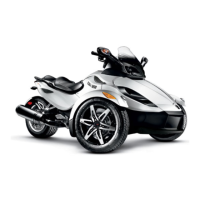WHAT'S DIFFERENT ABOUT THE SPYDER
ROADSTER
The Spyder roadster is a different type
of road vehicle. This section will help
you understand some of the vehicle's
distinctive features and operating char-
acteristics.
Stability
The three-wheeled “Y” configuration
provides greater low-speed stability
than a motorcycle. However, it is not
as stable as a four-wheeled vehicle
such as an automobile. Driving aid
technologies, like the electronic Vehi-
cle Stability System (VSS), help main-
tain stability during maneuvers, but
you can still lose control, tip or roll the
vehicle due to extreme maneuvers
(such as hard turns at high speeds) or
striking uneven surfaces or objects.
In addition, the operator or passenger
can fall off due to hard turns, accelera-
tion, braking or impacts.
Response to Road
Conditions
The Spyder roadster responds differ-
ently than other vehicles to certain
road conditions.
– Do not ride off-road or on ice or
snow.
– Avoid puddles and running water.
The vehicle hydroplanes more eas-
ily than a car. If you must go through
water, slow down.
– Slow down on gravel, dirt or sand
covered roads.
See the
ROAD CONDITIONS AND
HAZARDS
section.
Brake Pedal
One pedal brakes all three wheels.
There is no hand-operated brake, and
there is no way to brake front and rear
wheels separately. The Spyder road-
ster is better able to brake and steer at
thesametimethanamotorcycle. The
vehicle can stop quickly — be aware
of vehicles behind you that may not be
able to stop as quickly.
Antilock Braking System (ABS)
ThevehicleisequippedwithanAn-
tilock Braking System (ABS) as part of
the Vehicle Stability System (VSS). For
hard braking, press and hold the brake
pedal. ABS will prevent wheels from
locking.
Parking Brake
The parking brake mechanically brakes
the rear wheel only, and it locks in place
when engaged. It is not controlled by
driving aid technologies (e.g., ABS,
Electronic Brake Distribution). Do not
useittosloworstopthevehicle—you
could lose control, spin, tip or roll over.
Warn passengers not to touch it with
theirleftfoot.
Steering
Direct Steering
To steer your Spyder roadster, always
steer in the direction of the turn.
Motorcyclists — Do not countersteer
as it is done on a motorcycle. Unlike
a motorcycle, your Spyder roadster
cannot lean while turning. If you are a
motorcyclist, you must relearn how to
turn. Practice steering in the direction
of the turn at all speeds until you are
proficient.
Sideways Forces in Turns
Unlike a motorcycle, the Spyder road-
ster does not lean in turns. You will
feel sideways forces pushing you to
the outside of the turn. To maintain
balance, the operator and passenger
must hold on withboth hands and keep
both feet firmly planted on the foot-
pegs. In hard turns, it may help to lean
your upper body forward and toward
theinsideoftheturn.
32
_____
SAFE OPE
RATING INSTRUCTIONS
______

